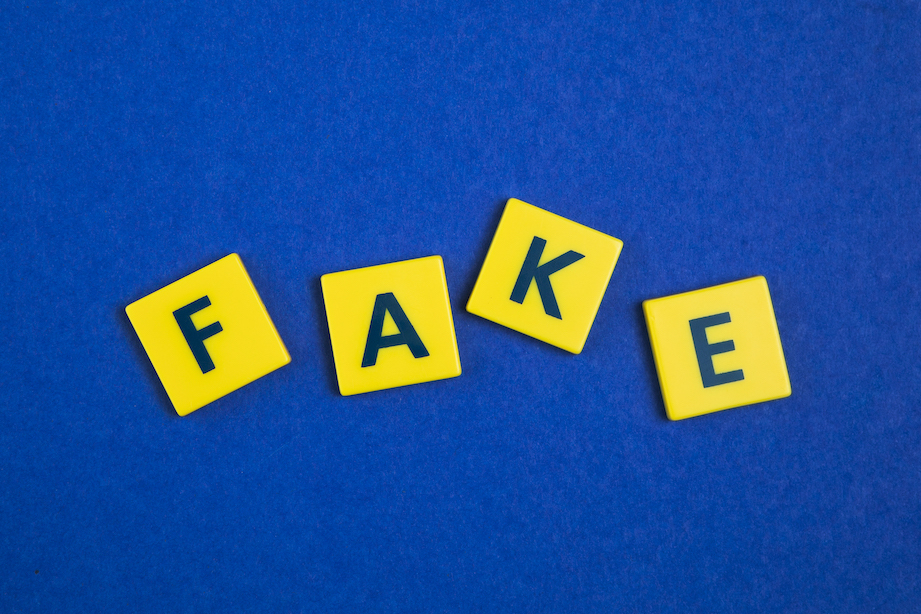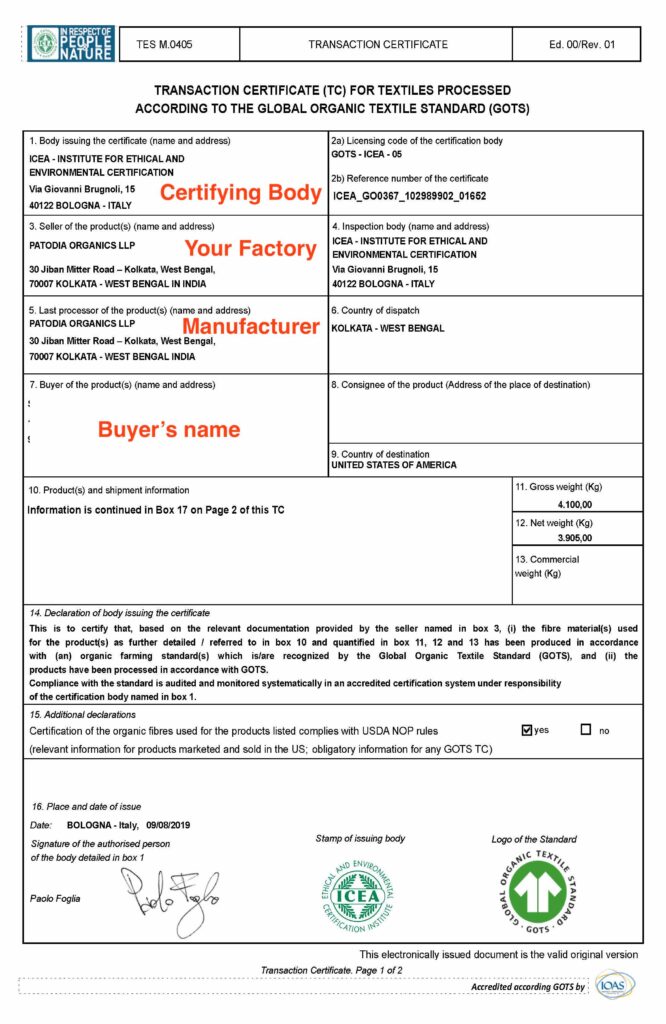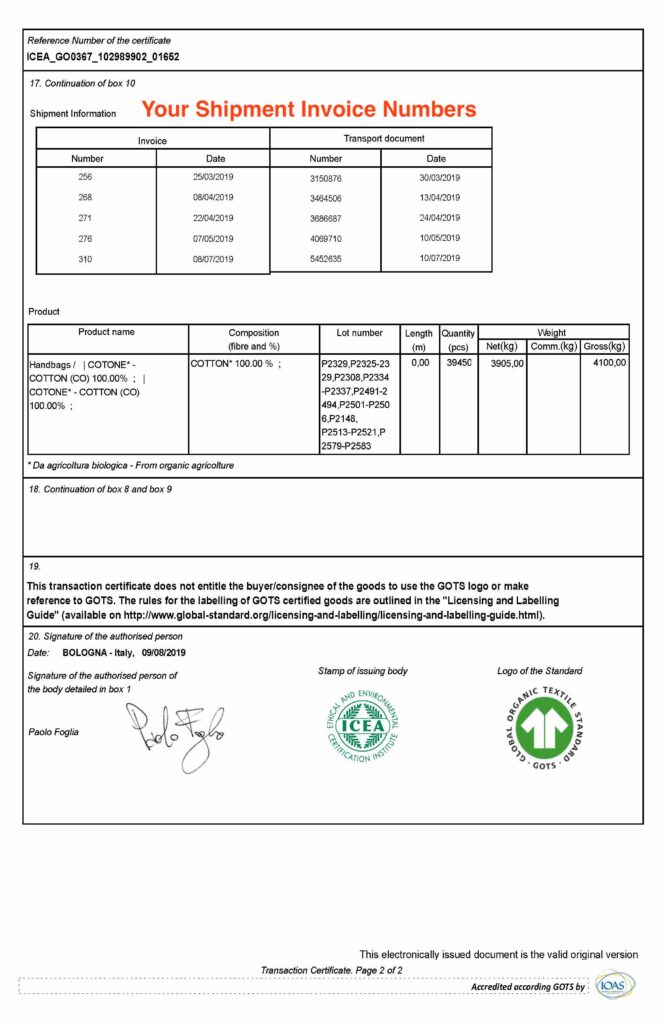
What’s the Issue?
In October ’20, GOTS (Global Organic Textile Standard), the global certification standard for organic cotton products, published a report which shed light on a disturbing discovery.
The report said that the organization had assured knowledge of 20,000 metric tons of fake organic cotton fiber, circulating in India. India, incidentally, is the source for over 50% of the global organic cotton fiber.
As a bag manufacturer, who started his business in 2008, with a focus on making organic cotton bags, this news did not come as a shock. Over the years, I have heard plenty of stories of people flaunting their ability to game the system. This still continues, though with GOTS latest implementation requirements, it will get tougher to get away with it.
As a factory which has been certified under the GOTS program, since 2011, I have seen how the GOTS system, which started off in 2006, was not aligned in many ways, in terms of having adequate checks and balances in place, to prevent the explosion of fake organic cotton products.
Anecdotally, there was a common perception that 30% of all organic cotton products, originating from India, were fake.
But then, as long as the bags could be called “organic,” and if the price was really low, a lot of buyers looked the other way. It was not uncommon to have a “don’t ask, don’t tell” policy between buyer and factory.
On several occasions, I recall losing out on orders to a competitor, based on a target price, which only made sense if the organic fabric price, was replaced with conventional cotton. Perhaps, there were other factors as well. However, this aspect was very much in play.
It has been widely believed that 30% of all organic cotton products originating from India, are fake
What in the world is going on with cotton prices?
Are you in the promotional space, where cotton / organic cotton bags are in vogue? Perhaps you are a cosmetic-products brand trying to figure out sustainable packaging options for your products. Or maybe you are trying to private label the bags and sell them direct to consumers, through channels like Amazon.
Regardless of which category you fall into, the trends in cotton pricing since March ’20, are going to impact you.
Have a close look at this chart below.

The single message here is that the price of raw cotton has gone up 75% between pre-covid times and now.
75%….yes that’s right!!
You think that is bad enough? Wait, there is more.
Till March ’20, the premium charged for organic cotton fiber, compared to conventional cotton, was about 5%. Then, the GOTS announcement happened in October ’20. Almost overnight, the premiums shot up. Today, the premium on organic cotton, has gone upwards of 50%.
Let’s understand what this means for you.
Say the price of conventional cotton fiber, was $1.00 per unit, in March ’20.
Price in July ’21: $1.75 / unit
Now, let’s see what has happened to organic cotton pricing.
Pricing in March ’20: $1.05
Pricing in July ’21: $1.75 +50% = $2.63 / unit
Bottom line:
Change in conventional cotton: 75%
Change in organic cotton: 150%
Still think you can get a “good deal” using March ’20 as your base? Think again.
Now, there is some good news here.
The eventual impact in terms of price, on the final product, is not necessarily 75% and 150%. It will depend on the following factors:
- Weight of the cotton fabric
- Size and specs of the bag
With the current price dynamics in the market, the situation is ripe for unscrupulous factories and middlemen, to pass on fake organic cotton products.
This problem will be especially prevalent in the promotional and packaging space, where the bags are a cost factor and not something you sell individually, like in the reselling space.
So caveat emptor – be careful of what you buy. If there is one thing you should get out of this article, it’s this:
If you think you are getting an unbelievable deal with your new organic cotton products factory, then chances are that you might be getting conned.
A Checklist for sourcing organic cotton products
So what can you do to safeguard yourself against being a victim of spurious organic cotton products? The following applies to both new suppliers and old.
- Ask for an updated GOTS certificate from your supplier. Make a note in your calendar, to ask for a renewed certificate, when applicable. GOTS certification is valid for one year only and needs annual re-audits.
- Check the factory’s listing in the GOTS public database
- If you don’t find it there, then check the following listing to see if the factory’s name features in the Certification Bans database, on the GOTS website.
- Before confirming an order with the factory, ask them if they will issue you a Product Transaction Certificate (TC). Let me say this again – Product TC, and not just fabric TC. Why is this important?
- The GOTS standard is a closed-loop system: all elements of the supply chain, must be GOTS-certified, unless otherwise mentioned in the latest GOTS Version 6.0. You can download the document here.
- When you get a fabric TC for your product, you are just assured of one element of the whole GOTS standard – there are several more, such as printing, dyeing the fabric, and accessories
Sometimes, a factory might agree to provide you with a product TC against a steep, ridiculous price. It’s not that expensive. We pay about $20 per product TC, to our certifying body ICEA.
- Remember, a product TC can be requested for every shipment invoice, every time. It can take 2-4 weeks after shipment, depending on the certifier and the factory.
I have to confess: till last October, we rarely requested a product TC from our certifier. 99% of our customers did not request it from us, so we didn’t bother. However, with all the developments over the last year or so, we now apply for product TCs as part of our regular paperwork. We have been sharing it with our clients voluntarily. Most of the times, they are initially surprised, because they are not even aware of this kind of paperwork.
Over the last 5 months, we have applied for and received over 50 product TCs. Here’s what a typical Product TC can look like:


Putting Things in Perspective
In today’s COVID world, there is an unprecedented effort on research to identify alternative sustainable raw material. This is a diverse set of materials such as truly vegan leather made from plant, natural oils, natural rubber, pineapple, and mushrooms, to name some. There is also an effort to take ocean plastic and convert them into material which can be used for shoes, for example. Adidas, Nike, All Birds – they are in the forefront of forging partnerships with start-ups focused on this space.
What’s also happening, concurrently, is the level of greenwashing which has not been seen before.
In the flurry of such activity, organic cotton is now like the granddaddy of them all. It’s been around the block a few times. It’s gone through iterations over the years, to make the program more robust, accessible, and fraudulent-proof.
As a current or potential consumer of this material, it is our responsibility then, to ensure that we put in the effort to buy only genuine organic cotton products.
Happy Sourcing and stay safe! 🙂
Other Blog Posts
So You Want a Strategic Partnership?
